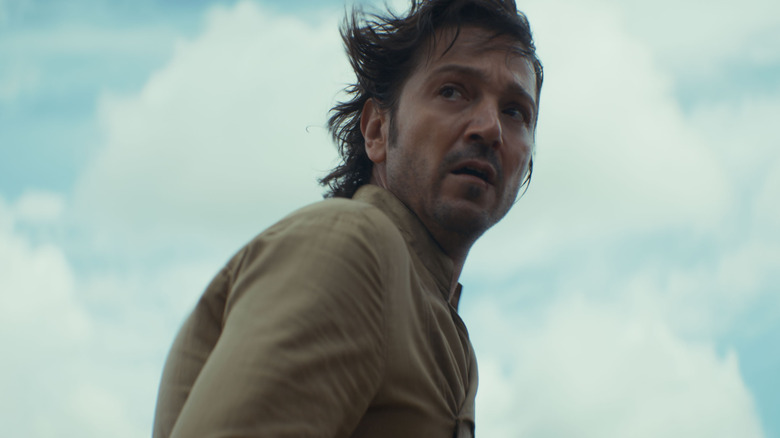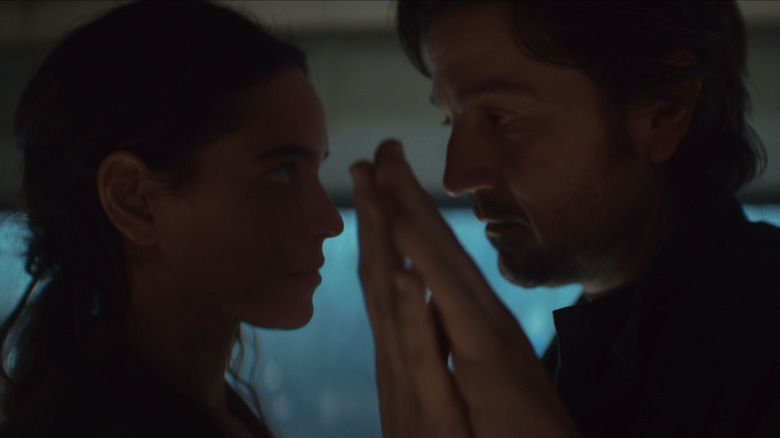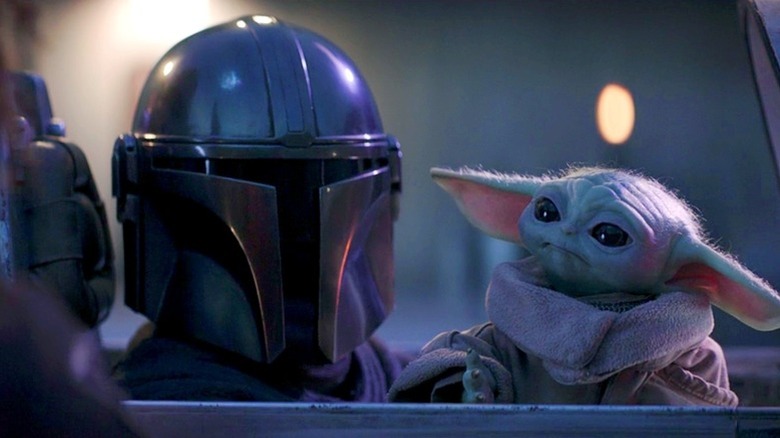Andor Is Over, And The Future Of Live-Action Star Wars Has Me Very Worried
This article contains spoilers for "Andor."
There was a time when the notion of a direct prequel to "Star Wars: Episode IV — A New Hope" was met with skepticism at best, ridicule at worst. Then "Rogue One: A Star Wars Story" went on to become one of the best "Star Wars" movies ever, and everyone shut up. The same thing happened when a prequel to "Rogue One" was announced, and it was met with skepticism and laughter. Then we got "Andor," and it turned out to be one of the best TV shows of the 2020s, as well as one of the boldest and biggest experiments in "Star Wars" history.
Season 2 of "Andor" is not just a masterpiece of television, but it's also a miracle. Indeed, it's kind of amazing that, in the year 2025, we've gotten a story set in a galaxy far, far away that would dare to explicitly call out genocide, in addition to illustrating how fascism creeps into all aspects of everyday life (even ways that are easy to miss). In doing so, "Andor" season 2 has successfully taken even the most simple, black-and-white elements of the original "Star Wars" trilogy and made them morally complex and nuanced.
Really, every episode of season 2 has felt like nothing we've seen in "Star Wars" before, as though it's doing something new and forever changing the franchise by showing how varied "Star Wars" can be. What we're left with is a property that can encompass the vastly different tones of "Skeleton Crew" and "Andor" without making either series feel out of place.
Now that "Andor" is done, however, what happens to "Star Wars?" For the first time in years, I am worried about the future of the franchise. Not that there won't be new fun releases, but this definitely feels like the end of an era.
No more live-action Star Wars in 2025
Of course, there was good Disney-era "Star Wars" before "Andor." We just had "Skeleton Crew" provide some pirate fun earlier this year, and before that, there was the exquisite action of "The Acolyte." The problem is that, when it comes to the future of the franchise now that "Andor" is over, we literally do not have much to look forward to.
As of this writing, there are zero confirmed live-action "Star Wars" releases until "The Mandalorian and Grogu" introduces a gladiatorial fighting Hutt in May of 2026, unless season 2 of "Ahsoka" manages to finish production and begin streaming before that. Moreover, the thought of the first "Star Wars" movie in seven years being a potential cameo-fest and a collection of baby jokes involving Grogu (a la the worst parts of "The Mandalorian" season 3) is, well, not what you'd call exciting. That's doubly the case coming on the heels of "Andor" season 2's incredible Ghorman arc, the sight of Mon Mothma (Genevieve O'Reilly) calling Emperor Palpatine a monster in front of the entire Senate, and Bix's (Adria Arjona) epic sacrifice for the Rebellion.
Regardless, even if "The Mandalorian and Grogu" ends up being a good time, what matters is there are no more "Star Wars" live-action projects for the entire rest of 2025. No movies. No TV shows. Nothing. Sure, we do have plenty of animated titles to look forward to, and if you know me, you know that I consider animation to be the medium where "Star Wars" thrives best, so this is in no way a dismissal of the property's upcoming animated releases (like the triumphant return of "Star Wars Visions").
Indeed, the immediate future of "Star Wars" is animated, but what about the live-action part of the franchise? As monumentally great and game-changing as "Star Wars" animated projects have been in the past, there's no denying they don't get as much attention as their live-action counterparts. So, what happens now? How does the franchise keep the momentum going after "Andor" ends? And, perhaps most importantly, is this a sign of things to come?
What does the future hold for Star Wars TV?
There has been a lot of talk about the disarray of Lucasfilm's theatrical output (see: the many "Star Wars" movies that've been canceled since 2015), but at least things seem to be heading in a better direction now, what with "The Mandalorian and Grogu" getting released in 2026 and "Starfighter" going into production later this year for a 2027 premiere. Rather, it seems the problem might be the TV side at this juncture.
"Star Wars" television has not only kept the franchise alive in the years since "Star Wars: Episode IX — The Rise of Skywalker" hit theaters, but it's also led to the property becoming bigger than ever. "The Mandalorian" alone made the entire world fall in love with Baby Yoda (aka Grogu), had people's eyes glued to Disney+ just to see the latest cute thing the baby would do, and even helped pave the way for "Andor." While not every series has been a winner, the "Star Wars" shows have nevertheless expanded what this franchise can be: "The Acolyte" featured wuxia-inspired action and took a darker look at the Jedi Order; "Obi-Wan Kenobi" gave us a fun young Leia adventure; and even "Ahsoka" literally expanded the "Star Wars" galaxy by taking us to previously unexplored places.
But that was before. Nowadays, we are all familiar with the cost-cutting mandates that plague every studio in Hollywood and have been responsible for the cancellation of plenty of beloved shows that were not given a proper chance to find their footing (like "The Acolyte," to use a fitting example). Is "Andor" the last hurrah of "Star Wars" live-action television? Will we even get more live-action series after the "Mandalorian" narrative wraps up? Or will we only get TV series that Lucasfilm's chief creative officer Dave Filoni is personally attached to?
Either way, it's a depressing thought, but it also makes the existence of "Andor" all the more special. This show has always felt like an anomaly within the larger franchise, but now that it's over, it truly feels like the end of an era of "Star Wars."
"Andor" is now streaming in its entirety on Disney+.


